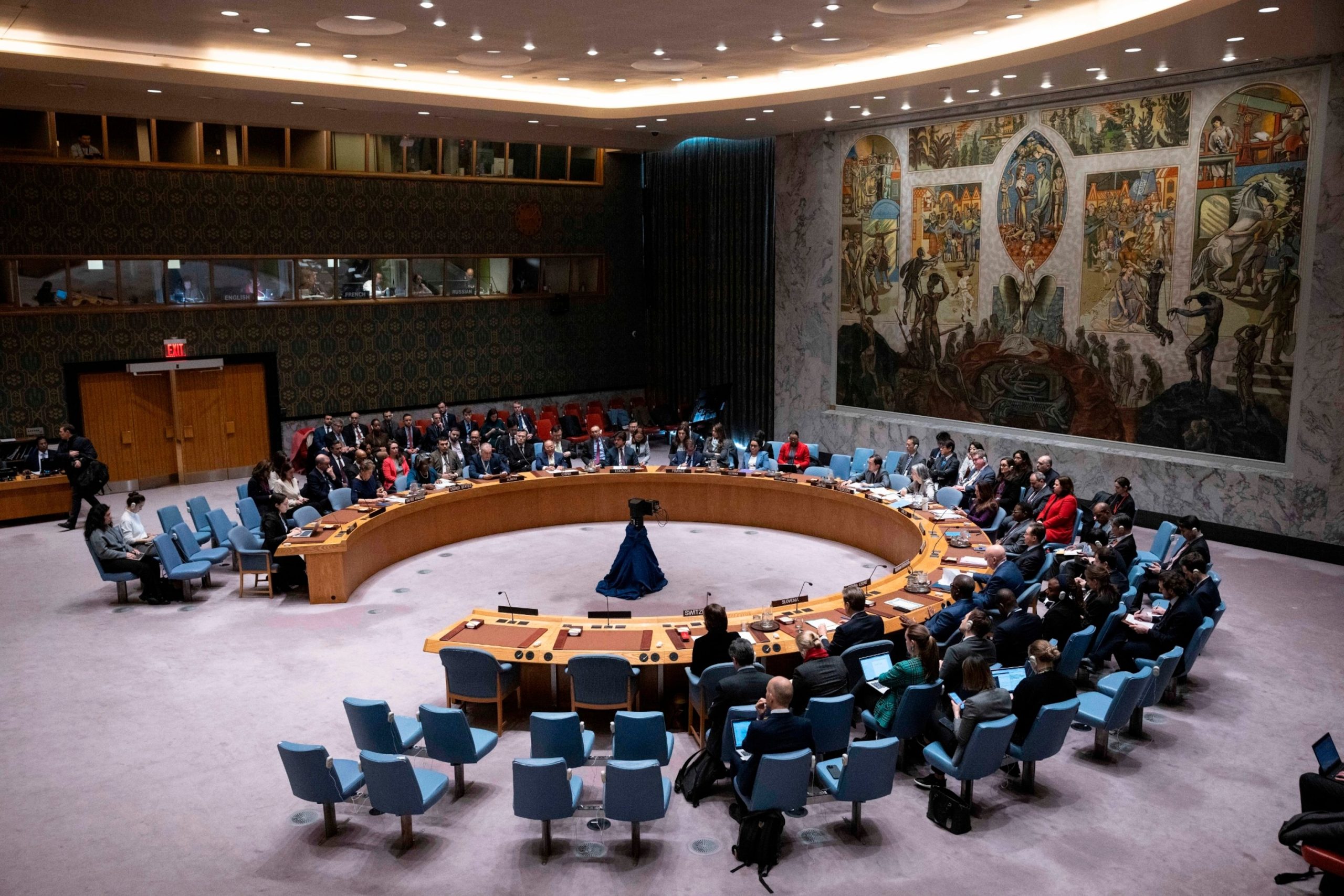A U.S. effort to ramp up political pressure on Israel by casting an international spotlight on its concerns failed Friday in the United Nations Security Council when Russia, China vetoed it.
Algeria also voted against. Eleven countries voted in favor and one abstained.
The resolution draft emphasized “concern that a ground offensive into Rafah would result in further harm to civilians and their further displacement including potentially into neighboring countries,” and decried the humanitarian toll of Israel’s offensive.
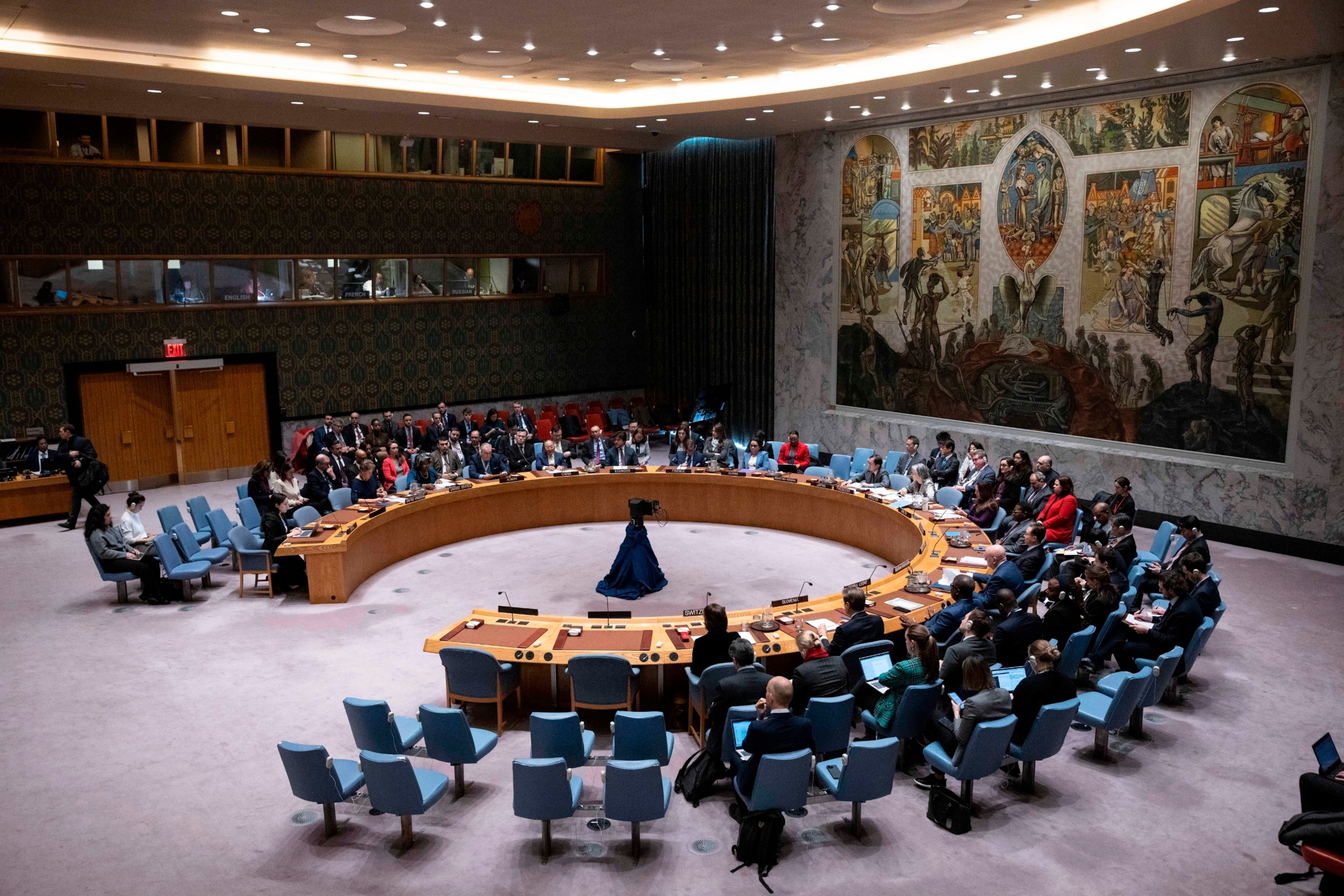
A general view shows the Security Council meeting at United Nations headquarters, March. 22, 2024.
Yuki Iwamura/AP
However, the draft also linked a cease-fire to the release of hostages held in Gaza — a position supported by Israel and a term that similar resolutions calling for a truce put forth by other nations have failed to include.
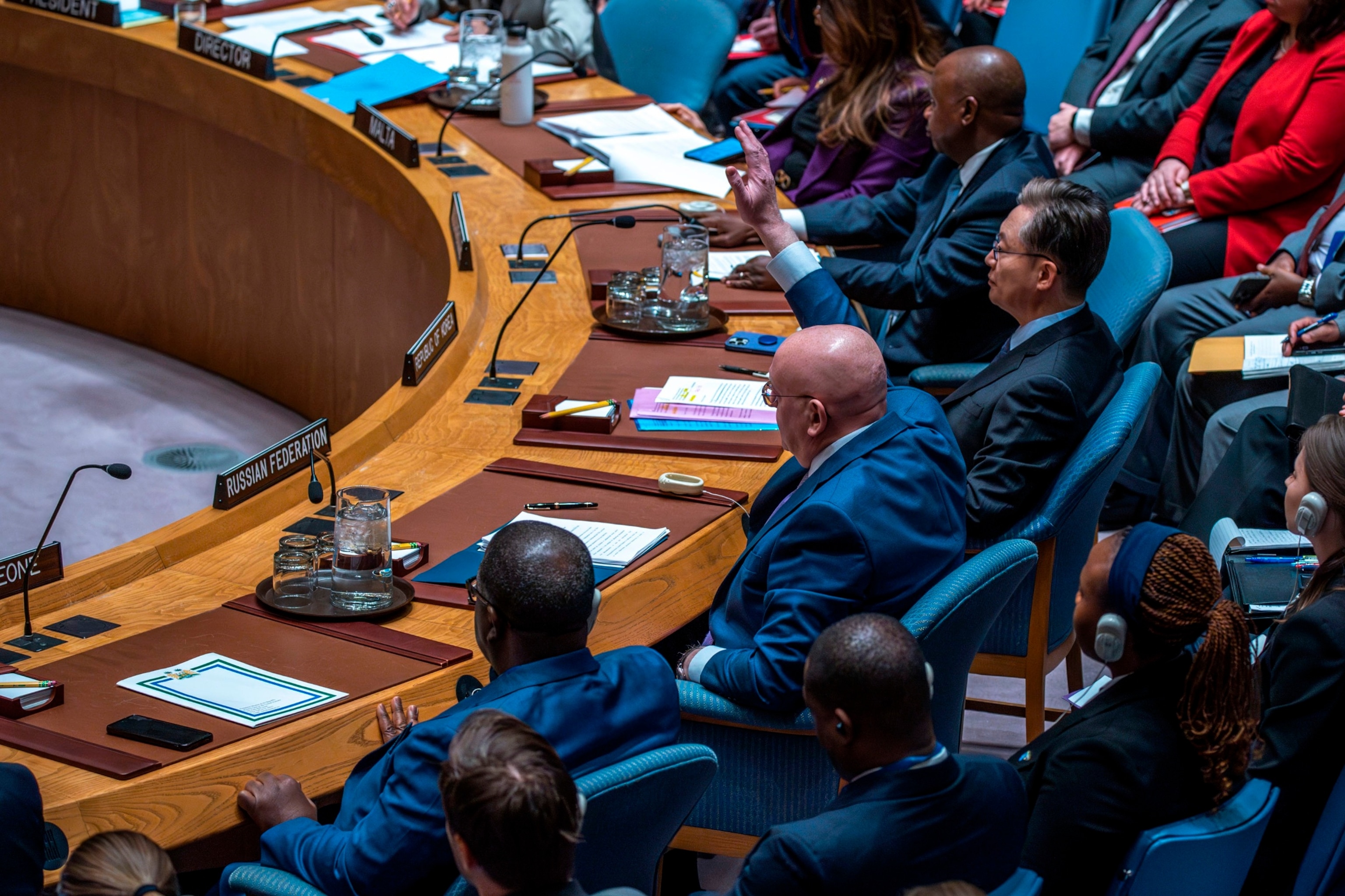
Russia’s Ambassador to the United Nations Vasily Nebensya, center, votes against a U.S. ceasefire resolution for the Gaza war during a UN Security Council meeting at the United Nations headquarters, March 22, 2024, in New York.
Eduardo Munoz Alvarez/Getty Images
“This resolution is an opportunity for the Council to speak with one voice to support the diplomacy happening on the ground and pressure Hamas to accept the deal on the table,” said Nate Evans, a spokesperson for the U.S. mission to the U.N. on Thursday.
As U.S. and Israeli officials publicly sound off over a potential ground incursion into Rafah in southern Gaza, officials in Washington have set the stage for a flurry of diplomatic engagements between the countries — aiming to head off a humanitarian catastrophe and avert a significant divide between the two allies.
Secretary of State Antony Blinken visited Israel on Friday, but before landing it the country, while visiting Egypt, he underscored the Biden administration’s opposition to major operation in Rafah, where thousands of Palestinian civilians are sheltering, under any circumstances.
“A major ground operation there would mean more civilian deaths,” he said. “There is a better way to deal with the threat, the ongoing threat posed by Hamas.”
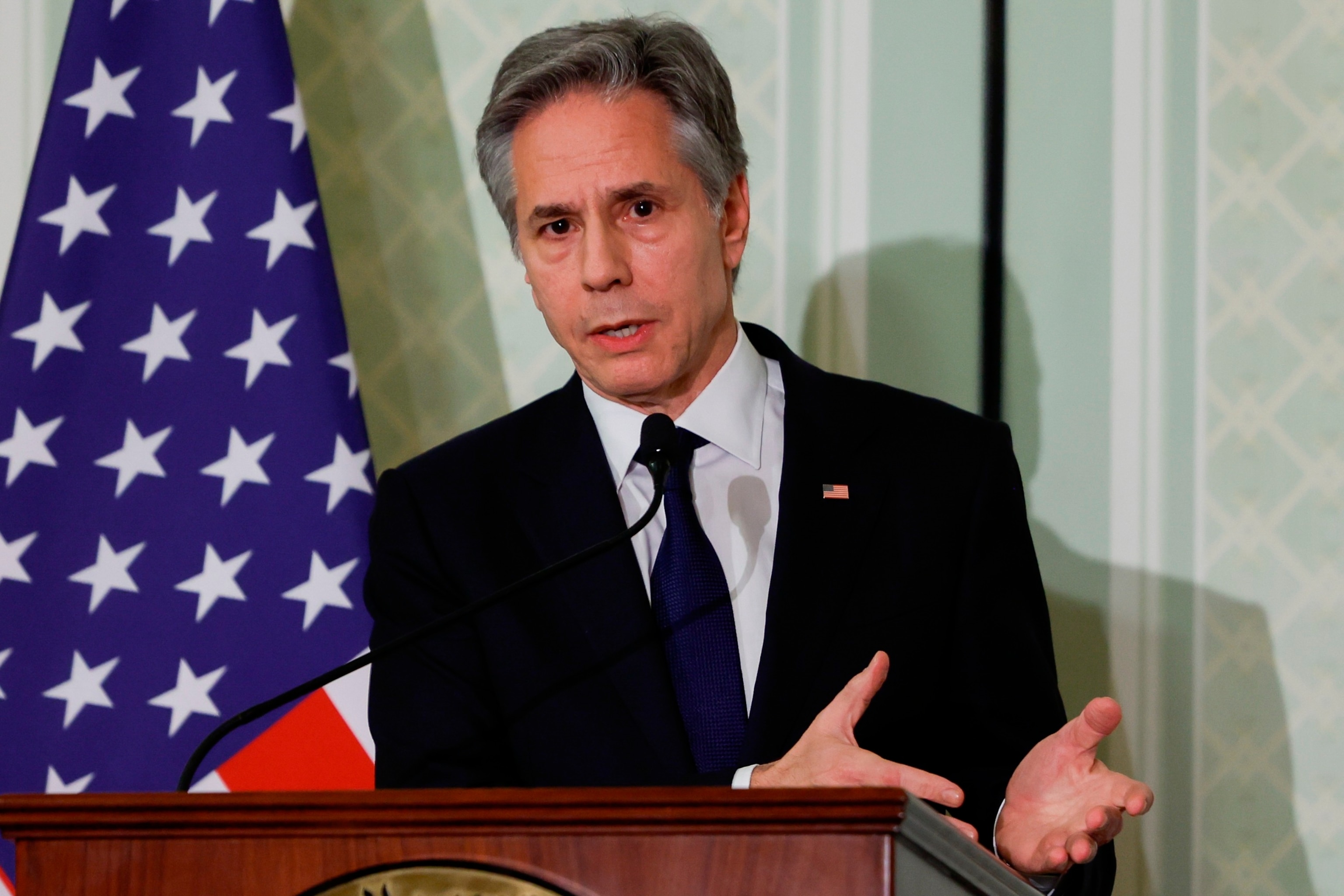
U.S. Secretary of State Antony Blinken holds a joint press conference with Egyptian Foreign Minister Sameh Shoukry, during his visit to Cairo, Egypt March 21, 2024.
Evelyn Hockstein/AP
Blinken’s stop in Israel was a late addition to the itinerary for his sixth tour of the Middle East since the Oct. 7 attack on Israel by Hamas, a U.S.-designated terrorist group. Throughout the conflict, the U.S. has repeatedly deployed top-ranking envoys to Israel in order to persuade Prime Minister Benjamin Netanyahu and his hardline government to take measures to protect civilians in Gaza.
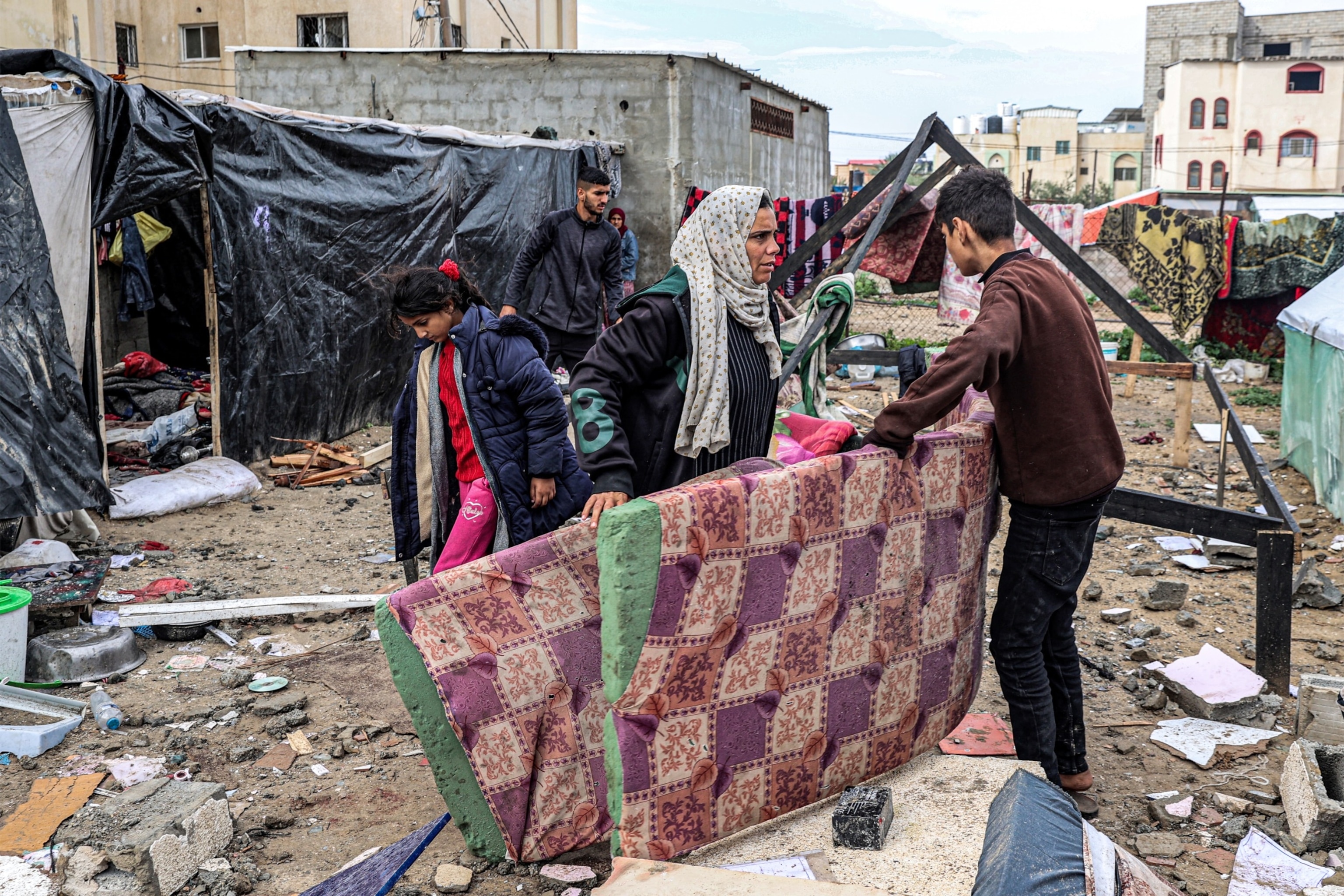
A woman and a boy move mattresses while standing before shelters erected outside a damaged building following overnight Israeli bombardment at the Rafah refugee camp in the southern Gaza Strip on March 19, 2024 amid the ongoing conflict in the Palestinian territory between Israel and the militant group Hamas.
Said Khatib/AFP via Getty Images
However, U.S. officials see a pending summit on their home turf as the best opportunity to persuade Israel to take a different approach with Rafah.
Blinken described next week’s planned meetings in Washington between the U.S. as a chance to convince Israeli officials to take “alternative actions” in Rafah, which an administration official said would consist of more targeted, high-value counterterrorism missions to eliminate Hamas.
“We are determined, as Israelis and indeed as other partners in the region are, to deal the ongoing problem posed by Hamas, a threat to so many,” Blinken said. “Hamas can be effectively dealt with without a major ground operation.”
As recently as last week, Blinken and other administration officials insisted that the U.S. stance on a Rafah incursion would depend on whether Israel could devise what Blinken described “clear and implementable plan” to limit civilian suffering.
But the White House’s approach changed abruptly on Monday after President Joe Biden and Netanyahu held their first call in over a month.
According to a readout of the conversation, Biden expressed “deep concerns” about looming Israeli action in Rafah. Just hours later, national security adviser Jake Sullivan announced the administration’s firm opposition, and said that Netanyahu had agreed to send an interagency team to the U.S. for talks on the matter.
In the meantime, Netanyahu has done plenty of talking himself — defiantly rejecting Biden’s demands and vowing to move ahead with the operation in a public address to members of his government, and even meeting virtually with Senate Republicans to discuss the state of the conflict in Gaza.
As the summit looms, U.S. officials have not specified whether Israel will face any repercussions if it charges ahead with battle plans.
ABC News’ Selina Wang contributed to this report.
On May 12, 2021, Russia and China vetoed a United States resolution calling for an immediate cease-fire in Gaza, highlighting the deep divisions within the United Nations Security Council over the ongoing conflict between Israel and Hamas. The resolution, which was co-sponsored by France and Tunisia, aimed to halt the violence that has claimed the lives of hundreds of Palestinians and Israelis in recent days.
The veto by Russia and China came as a blow to the United States, which had been pushing for a swift end to the hostilities in Gaza. The U.S. Ambassador to the United Nations, Linda Thomas-Greenfield, expressed disappointment at the veto, stating that “every day that we delay, more civilians die.”
Russia and China justified their decision to veto the resolution by citing concerns over its one-sided nature and lack of balance. Both countries argued that the resolution did not address the root causes of the conflict and failed to hold Israel accountable for its actions.
The veto by Russia and China reflects their longstanding support for the Palestinian cause and their opposition to what they see as unilateral actions by the United States in the Middle East. It also underscores the growing influence of these two countries on the international stage, as they continue to assert themselves as major players in global affairs.
The ongoing conflict in Gaza has sparked widespread condemnation from the international community, with calls for an immediate cease-fire growing louder by the day. The United Nations has warned that the situation in Gaza is rapidly deteriorating, with a humanitarian crisis unfolding as essential services are disrupted and civilians are caught in the crossfire.
Despite the setback at the United Nations, efforts to broker a cease-fire continue, with diplomatic initiatives underway to bring an end to the violence in Gaza. The United States, along with other key players in the region, including Egypt and Qatar, are working tirelessly to find a peaceful resolution to the conflict and prevent further loss of life.
As the world watches in horror at the escalating violence in Gaza, the need for a swift and sustainable cease-fire has never been more urgent. The veto by Russia and China may have stalled progress at the United Nations, but it has not dampened the resolve of those working tirelessly to bring an end to the bloodshed in Gaza.
